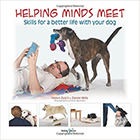
Helping Minds Meet - Skills for a better life with your dog
Helping Minds Meet follows on from the authors’ Life Skills for Puppies (1), and, like the previous book, looks at training in a wider context, at the dog’s ability to cope, rather than just obey commands. Helping Minds Meet also stresses ways to develop a good relationship with our dogs, starting out with recognizing that we have different priorities, partly because we come from different species. Differences can be a source of strength, as well as a source of disagreement, and part of forming a good relationship is learning to accept and use those differences.
Chapter Two deals with boundaries and limits, and how to teach these, for example through making sure all human members of the household apply the same rules when they interact with the dog, and generalizing commands by teaching them in different situations. Chapter Three tackles ways to respond to canine mistakes while keeping your cool, as well as ways to prevent mistakes.
Chapter Four, ‘We don’t speak the same language’, is packed full of illustrations of canine body language, and explanations of how to understand what dogs try to tell us, about what they feel about humans, other dogs, objects and situations. This is a key chapter, because, as Chapter Five reminds us, Communication is a two-way process. The fifth chapter focuses on how what we do can be interpreted by dogs, ways in which we might confuse them, or encourage them to act up, and ways to get them to listen to us.
Both humans and dogs benefit from learning to using impulse control, and keeping stress at levels we can cope with, the subjects of Chapters Six and Seven. We can’t avoid stress, so it’s important to develop resilience. The last chapter deals with enjoyable activities that dogs and humans can do together.
Helping Minds Meet aims to help owners to developing good relationships with their dogs through communicating better, and teaching coping skills, like learning to cope with strange dogs. It’s not a week-by-week guide to training commands, so if you’re looking for a guide to obedience training, you may find it frustrating. Even so there are suggestions for training in specific everyday situations which can be more effective in improving a dog’s overall behaviour than training taught in short sessions that are separate from a dog’s life as a whole.
This integrative approach to training – training as part of everyday life, and involving the whole of the relationship between owner and dog – is similar to that of Leslie McDevitt’s Control Unleashed (2). Helping Minds Meet is much more accessible to novices, both because it’s generally well-structured, and because there’s a more detailed explanation of how to understand canine body language. It’s a useful book for trainers to recommend to novice students both because it’s easy to understand, and because it points to ways that owners can use their developing training skills outside the class. There are worksheets which can be set as homework. It’s also a book that owners can use them without a professional trainer.
Structuring an integrative training guide is challenging, and the structure of Helping Minds Meet is strong enough to make it easy to find your way around this book. However, maybe it would make more sense to explain canine body language, and effective ways to communicate with dogs nearer the start, before dealing with mistakes. Sometimes humans unwittingly encourage dogs to do things we’d rather they didn’t do, for example, children can encourage dogs to snap by suddenly grabbing and kissing them. Owners of small, cute dogs may have an overwhelming urge to pick them up and cuddle them, without checking whether the dog might be taken by surprise, and find this a bit overwhelming. Dealing with how dogs communicate, and two-way communication before ‘mistakes’ would make it easier to see that sometimes the mistake is ours, because there’s been a communication failure, and we’ve pushed a dog beyond his or her limits.
The focus in this book is on the dog, though the chapters mention ‘we’, for example Chapter Six is called ‘Life is generally better if we can both learn to think before we act’. Perhaps a little more focus on the human side of impulse-control would be helpful, especially in situations where human impulses often override our common sense. Before unleashing a dog to play with another, for example, it may help to go through a checklist of questions, like ‘do I have permission from the owner of the other dog? What does my dog’s body language tell me about how he (or she) feels about this encounter?’ Chapter Seven is called ‘We both function better when we are less stressed’, and again, maybe it’s worth looking a little more at the human side of this. Planning a day so that both our needs and our dogs’ needs can be met can save a lot of stress. Waiting until a dog gets plaguey before going for a walk is more stressful than scheduling a walk when the dog is most active, and giving the dog the security of a structured timetable. A little forward planning can help us feel more in control, so more relaxed and confident, and better able to teach our dogs to relax and tackle situations with confidence.
A great strength of this book is its focus on the relationship between individuals of different species with all that implies, accepting our differences, learning and teaching new ways of communicating, and seeing the world from the point of view of another species. The integrative approach also shows owners how lessons learnt in training classes can be used in everyday life. Despite minor grumbles, ‘Helping Minds Meet’ is certainly a book which trainers can recommend to students with confidence. It’s also a useful book for people taking on new dogs, because it’s easy to forget some of the basics. If we began training dogs in the days when training meant teaching commands, the integrative approach explained here is also very refreshing.
Review by Alison Lever, 2015
References:
1) Zulch, Helen and Daniel Mills, B. (2012) Life Skills for Puppies. Hubble and Hattie, Dorset
2) McDevitt, Leslie (2015) Control Unleashed: The Puppy Program. Clean Run Publications, South Hadley MA



